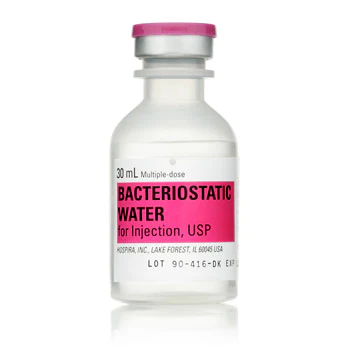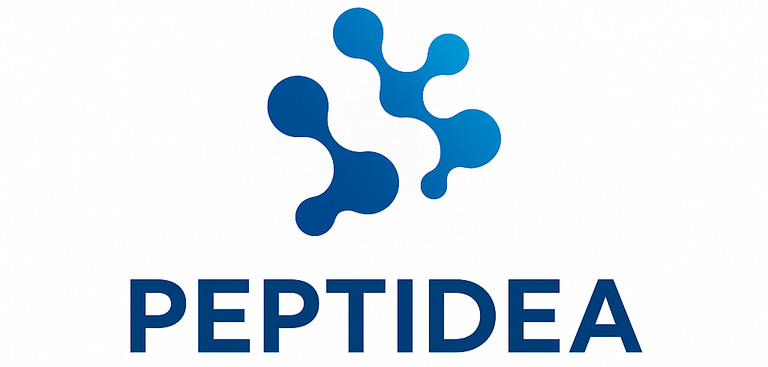
Bacteriostatic Water for Injection, USP
30 mL sterile multi-dose vial
$19.99
Out of stock
Composition:
Primary Component: Sterile, purified water that has been filtered and treated to remove impurities, microorganisms, and pyrogens (fever-causing substances).
Preservative: Contains 0.9% benzyl alcohol, which prevents bacterial and microbial contamination, allowing the solution to be used multiple times within a specified period (typically up to 28 days after opening).
pH: Neutral or slightly adjusted (around 5.7–7.0) to ensure compatibility with injectable compounds.
Purpose and Uses:
Peptide and Hormone Reconstitution: Bacteriostatic water is commonly used to dissolve lyophilized (freeze-dried) peptides, such as DSIP, GHK-Cu, BPC-157, or others, for research purposes. It creates a stable solution for accurate dosing in experiments.
Dilution of Medications: Used to dilute concentrated drugs for intramuscular, subcutaneous, or intravenous administration in clinical or research settings.
Multi-Use Capability: The benzyl alcohol preservative allows multiple withdrawals from the same vial, making it practical for repeated dosing in research protocols.
Laboratory Applications: Employed in cell culture, microbiology, or other experiments requiring sterile, non-pyrogenic water.
Key Properties:
Sterility: Manufactured under strict aseptic conditions to ensure no microbial contamination.
Bacteriostatic Effect: Benzyl alcohol inhibits bacterial growth, extending the shelf life of an opened vial (typically 28 days when stored properly).
Non-Pyrogenic: Free of pyrogens, ensuring safety for injection in research models or clinical settings.
Clear and Colorless: Visually indistinguishable from pure water, ensuring no impurities affect reconstituted compounds.
Storage and Handling:
Storage: Store at room temperature (15–25°C) or refrigerated (2–8°C) to maintain sterility. Avoid freezing, as it may compromise the vial’s integrity.
Shelf Life: Unopened vials typically have a shelf life of 1–2 years. Once opened, use within 28 days to prevent contamination.
Handling: Use sterile syringes and needles for withdrawal to maintain sterility. Discard if the solution appears cloudy or contains particles.
Packaging:
Typically supplied in multi-dose vials (e.g., 10 mL or 30 mL) with a rubber stopper for repeated access.
Available from pharmaceutical suppliers, labeled for research or medical use.
Considerations and Limitations
Not for Direct Injection: Bacteriostatic water is a vehicle for reconstitution or dilution, not a standalone injectable. It should only be used with compatible compounds.
Benzyl Alcohol Sensitivity: Some research models or subjects may be sensitive to benzyl alcohol, potentially causing irritation or allergic reactions at the injection site.
Not for Neonatal Use: Due to benzyl alcohol, bacteriostatic water is contraindicated in neonates, as it may cause toxicity (e.g., gasping syndrome).
Contamination Risk: Despite the preservative, improper handling (e.g., using non-sterile needles) can introduce contaminants. Always follow aseptic techniques.
Regulatory Status: Available for purchase as a research or medical supply, but its use must comply with local regulations. It’s not a drug but a pharmaceutical aid.
Alternative
Trusted source for high-quality research peptides.
Support
info@peptidea.net
© 2025. All rights reserved.
Peptidea is a supplier of high-purity peptides, proteins, and amino acid derivatives intended solely for research and development purposes. Our products are not for human consumption. In research settings, peptides are often studied for their potential applications in areas such as weight management, anti-aging, and energy enhancement. All products are provided as lyophilized powders, requiring reconstitution with bacteriostatic water for research use. The statements on this website have not been evaluated by the US Food and Drug Administration, and our products are not intended to diagnose, treat, cure, or prevent any disease. Peptidea is a chemical supplier and is neither a compounding pharmacy nor a chemical compounding facility as defined under Section 503A of the Federal Food, Drug, and Cosmetic Act, nor an outsourcing facility as defined under Section 503B of the same Act.
